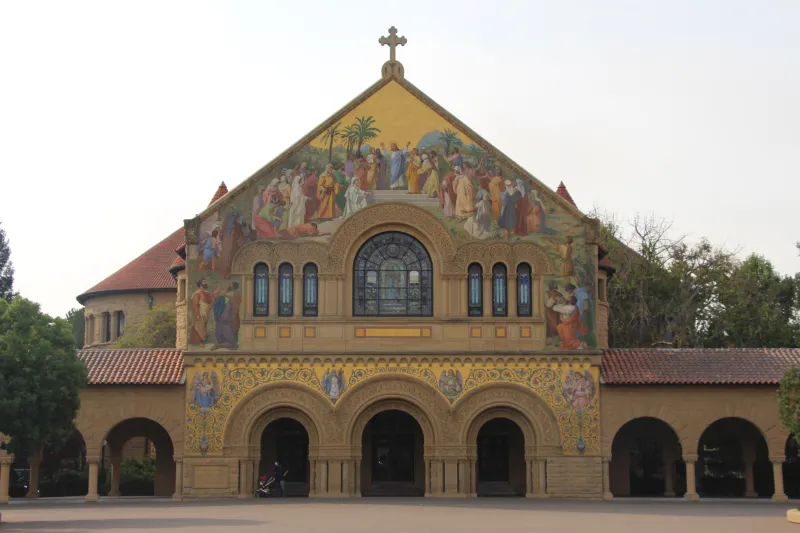On Saturday morning, I walked across the desolate, puddle-covered campus to the Li Ka Shing Center for a live video chat with a man named Father Thomas Keating. Father Keating’s speech was organized by the Contemplation by Design program here at Stanford, and it was the first event I signed up for when the list of events became available.
A Trappist monk by practice, Father Keating also created the framework for Centering Prayer, a contemplative, mystic-influenced form of prayer drawing on both the Catholic tradition and ideas from Eastern spirituality. I couldn’t wait to hear him speak and, if I was lucky, ask him a question myself.
I am not the person you’d expect to be the only undergraduate at a talk by a Catholic monk. I’m not Catholic, or even Christian; the last time I went to church, I was 8 years old, and the only time you’ll hear God or Jesus Christ mentioned in my house is in the form of an expletive. My mom and I occasionally discuss Buddhism and non-religious spirituality, but God has never factored into our conversations.
I sat down in the Li Ka Shing lecture hall among a crowd of 50+ people, Father Keating’s aged and smiling face staring down at us from a huge projector screen in the front of the room. I didn’t know quite what to expect, but I’d read good things about his prayer method, and wanted to expose myself to the practice even though I didn’t believe in the religion itself.
To my pleasant surprise, Father Keating began with a discussion of developmental psychology, walking us through the psychological disappointments, traumas and episodes of neglect that form our insecurities and repressed anxieties later in life. He talked about how, later in life, we may turn to a plethora of distractions to avoid the deeper sadnesses and angers that reside in our minds – not only drugs and alcohol, but unhealthy relationships, overworking and expensive travel experiences, too (we can probably all relate to at least one of those).
Father Keating then made the leap into religion, explaining how the centering prayer method – essentially a meditation using a focus word – can help us become aware of our unconscious anxieties and, with enough time, put us in touch with the bottomless and steady love of God himself.
“The love of God,” for a non-believer, may be easily dismissed as a pointless sentiment for those without faith. At first, I had a similar reaction: I appreciated meditation, but how could I benefit from the concept of divine love? Nonetheless, I had come to the session with an intentionally open, creative mind, and decided to think about how God might be useful for me as a metaphor.
In the days following the talk, I believe I’ve deciphered a meaning for “the love of God” that can be applied to secular thinking with a bit of imaginative symbolism. In my mind, I replaced the word “God” with the sum total of the universe – all the observable things, from planets to single-celled organisms to our fellow humans (and this is not so far off from the religious meaning of God). “The love of God” became “the love of the universe” during my prayer. And it clicked.
The more I thought about it, the more I realized how much the universe has transpired to make my life livable and meaningful. The sun provides energy and warmth for our planet; the plants and animals provide me with oxygen and food; even bacteria allow me to digest my food. Fellow humans give me connection and a sense of purpose in the greater good of mankind. I am alive and healthy, thanks to all these factors and many more, and my life is neither tortuous nor completely unstable. If that is not a reflection of the universe’s love – the universe’s care for me, intentional or otherwise – then I do not know what is.
I believe that God and religion can provide those of us without explicit faith with important metaphors and frameworks for bringing more peace, joy, and gratitude into our lives. I encourage you to be open to religion and what is has to offer, adapting the teachings to whatever you believe in. If you are a Buddhist, attend a Jewish service; if you are Christian, attend a Baha’i service; if you do not affiliate, attend an Islamic service.
See how different ways of framing God, humanity and the mystery beyond resonate with you. Religion, ultimately, does not have to be a set of beliefs, but has the opportunity, through its diversity of teachings, to be a portal into a better self and society. Be open to what all religions have to offer, and you might be surprised that “God,” as metaphor, can change your perspective on life, too.
Contact Avery Rogers at averyr ‘at’ stanford.edu.
